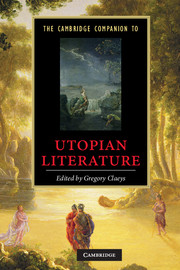8 - Feminism and utopianism
from Part II - Literature
Published online by Cambridge University Press: 28 September 2010
Summary
Feminists have joined in celebrating and critiquing utopianism. On the one hand they have profited from the socio-political changes that visions of better societies have impelled; on the other, they have called into question utopias that depict static perfection - societies so ideal that they have nowhere to go, rely on rigid hierarchies and use coercion to maintain their perfect order. Thomas More's Utopia (1516) epitomizes the traditional version: it is fully mapped, boasting uniform towns that are geometrically organized with a centrally located seat of power from which the sovereign can conduct surveillance. Infrastructure supports the discipline of inhabitants; architecture and institutions encourage certain behaviours and discourage others. Ancient books, repeated rituals, pervasive symbols and signs ground authority in the traditional utopia. Clothing is issued and regulated. Dissenters are expelled or incarcerated. Such traditional utopias have also been called 'classical', 'blueprint', or 'end-state' utopias, and many critics have concurred that, even though inhabitants are provided for, such visions are distasteful. Despite readers' admiration for the wit and inventiveness of More's Utopia, few would want to live there. Women in particular have fared poorly in traditional blueprint utopias, where they have been forced to labour endlessly and bow to humourless patriarchs.
- Type
- Chapter
- Information
- The Cambridge Companion to Utopian Literature , pp. 174 - 199Publisher: Cambridge University PressPrint publication year: 2010
- 17
- Cited by



